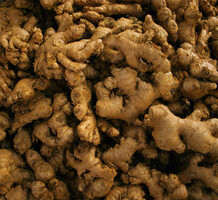Potential Ginger Side Effects, Adverse Reactions And Contraindications
|

|
Ginger is a root plant that works as a great spice in many culinary dishes but it also has great healing qualities. It has been used to treat conditions like arthritis, menstrual pain, coughs, motion sickness and even diarrhoea.
It generally is helpful in reducing nausea and inflammation in the body. It can be found in a variety of forms such as capsules and oils, but it is also great to use freshly for both culinary and medicinal purposes.
Although side effects of this plant are very rare due to the common use of it, there are some potential ginger side effects, adverse reactions and contraindications that you should keep in mind.
Allergic ginger side effects
It is very rare to be allergic to ginger, but in some cases some mild forms of allergy can be present. These include skin rashes and itching. If you do experience more severe forms of allergic reaction like swelling in the throat, you should contact a healthcare professional.
Some people who use ginger for prolonged periods may experience a dry and scaly rash, which can develop initially on the face.
Common side effects of ginger
The more common, although rarely reported, ginger side effects can include nausea, headaches and general stomach discomfort. It can also cause heartburn and irritation of the mucosal linings of the mouth and purging of gallstones. These are often due to excess dosages of ginger. Thus, by consuming it in moderate amounts, it is possible to avoid these ginger side effects.
Some people also feel taking ginger in capsules limits the experience of discomfort and you could try taking ginger that way.
In some cases, it has been shown that ginger can lower your blood sugar and thus it is best to avoid using it if you are taking medications for diabetes or at least to consult your healthcare provider about the safe amounts to use.
It is possible that you experience the ginger side effect of excess bleeding, for example during menstruation for women. WebMD also recommends that people who are taking other blood thinning supplements or medications don’t use ginger as it may increase your risk of developing excess bleeding.
Pages: 1 2
|
Follow this site
|
















Recent Comments